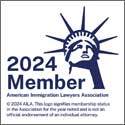This past Friday, U.S. Citizenship and Immigration Services (USCIS) announced a final rule expanding the existing provisional waiver process to allow all persons who statutorily qualify for the waiver to apply. This expansion of the rule will take place beginning on August 29, 2016.
The expansion of the provisional waiver process applies to anyone else who did not qualify for permanent residence in the United States because they are currently out of status and are not immediate relatives. Effective August 29, 2016 people will be eligible to apply so long as they have an application for relief where the priority date is current, such as a family based or employment based petition, and they have a qualifying family member for the purpose of filing for a waiver. A few common examples of people who qualify for waivers are as follows. (1) marriage to a lawful permanent resident (LPR). First, the LPR spouse is the petitioner. When the priority date is current, she can also be the qualifying relative for the waiver. (2) US Citizen sibling files petition. When the priority date of the petition becomes current, the immigrant will need a qualifying relative to be eligible to apply for the provisional waiver; a US Citizen or a lawful permanent resident who is either a parent or spouse. (3) Employer files labor certification and subsequently a petition with US Citizenship and Immigration Services. When the priority date becomes current, the immigrant will need a qualifying relative to be eligible to apply for the provisional waiver; a US Citizen or a lawful permanent resident who is either a parent or spouse.
For a waiver to be successful, an applicant will have to show that a qualifying member will suffer “extreme hardship” if the waiver was not approved and the applicant was not eligible to return to live in the United States. Qualifying family members are defined as spouses and parents who are either US Citizens or lawful permanent residents. If a provisional waiver is approved, the applicant will still have to depart to United States for the processing of their immigrant visas. However, provisional waivers allow people to wait for a decision on the waiver application before departing the United States. Finally, a provisional waiver will not be granted if USCIS believes that the applicant will need a waiver for any other reason.


